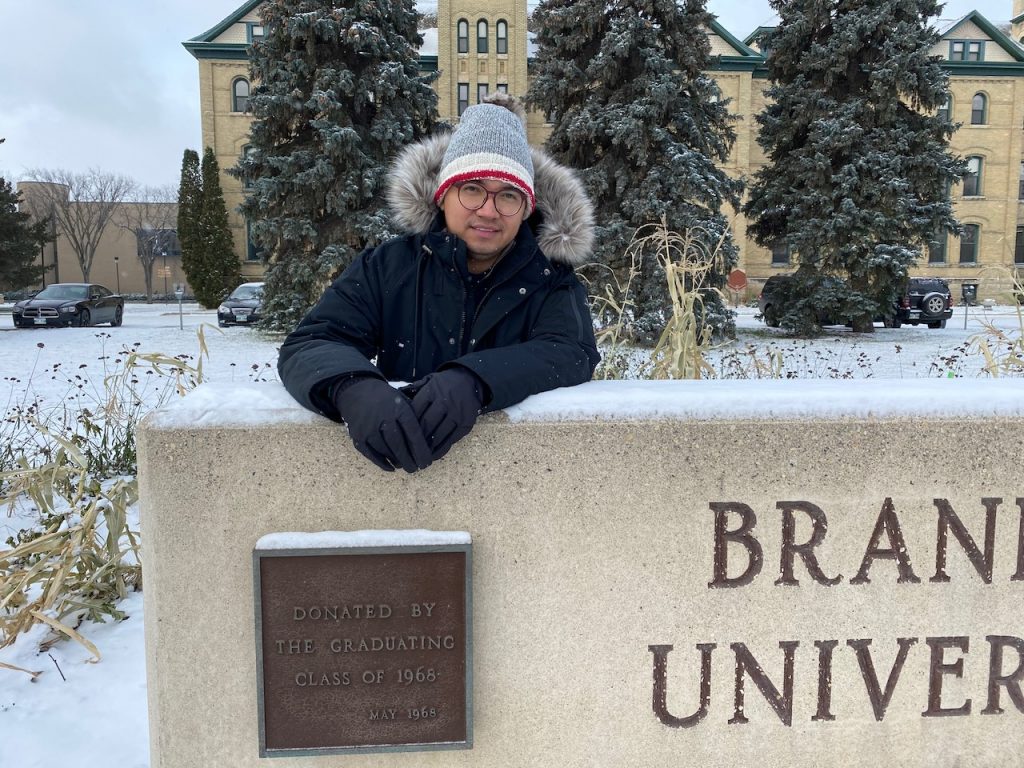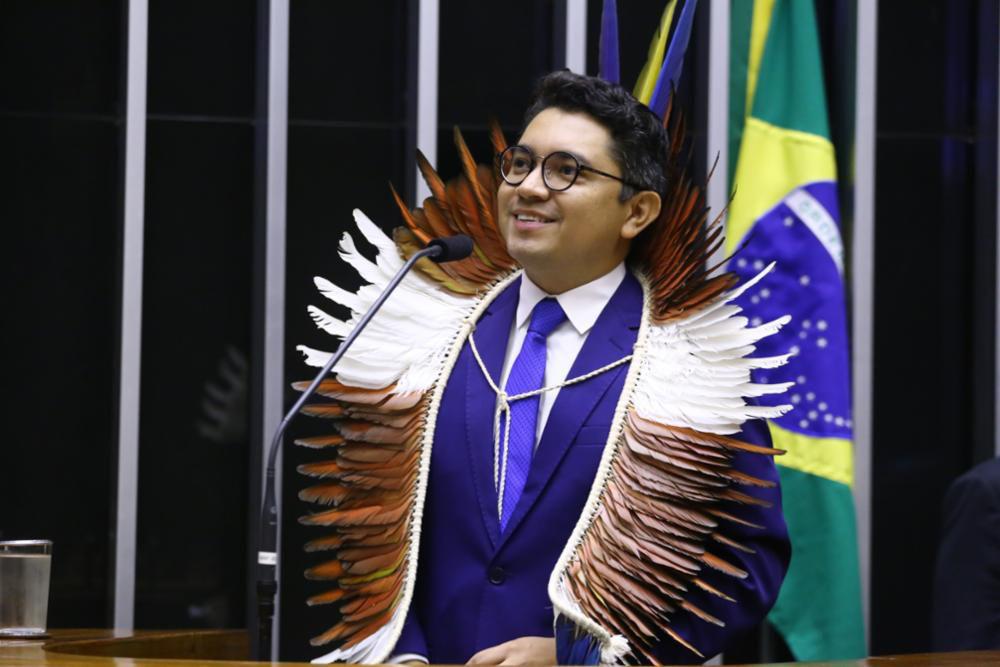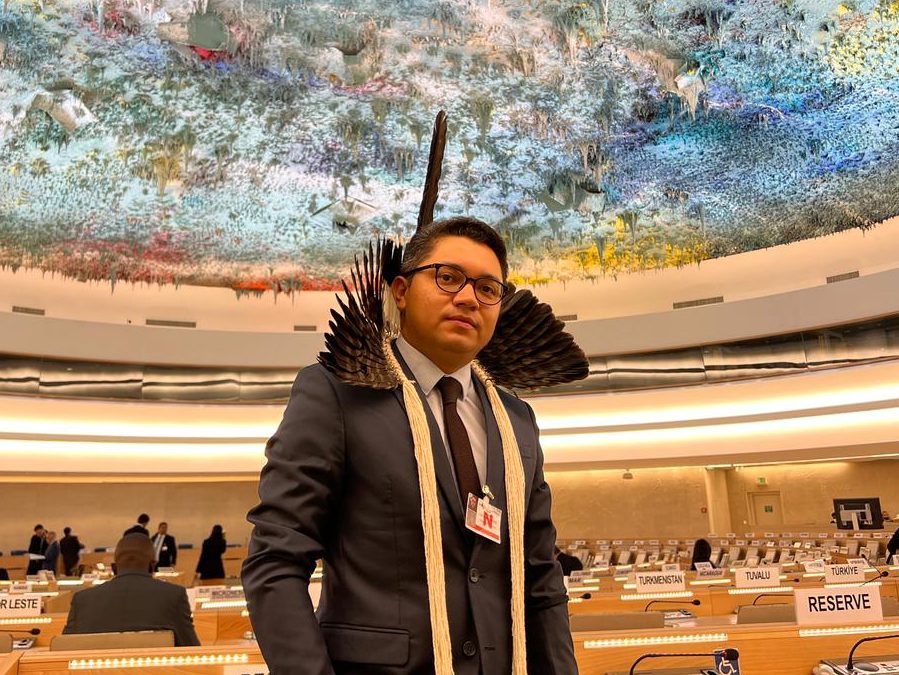Dr. Luiz Henrique Eloy Terena has taken a remarkable journey from his youth in a small Indigenous village in Brazil to a key position in the newly established Ministry of Indigenous Peoples in the capital of Brasilia.
It is a remarkable story with a strong Canadian connection. Working actively towards internationalization of its campus, Brandon University (BU), with financial support from Government of Canada’s Emerging Leaders in the Americas Program (ELAP), has played an important role in Terena’s life journey.
The first Indigenous lawyer to win an Indigenous land rights case in Brazil, Terena was recently named Executive Secretary — roughly the equivalent of a vice-minister — in the ministry, which was established in January to fulfil an election promise made by new Brazilian President Luiz Inácio Lula da Silva.
With two PhDs, in Social Anthropology as well as Law, Terena has impressive academic credentials. His education is particularly uncommon for someone from his background in Brazil, having grown up in the village of Ipegue, in the state of Mato Grosso do Sul. Along the way he made a relatively short, but meaningful, stop at Brandon University (BU). He spent six months at BU, in 2019 and 2020, through the Emerging Leaders in the Americas Program, as part of his dissertation for his doctorate in Social Anthropology at Universidade Federal do Rio de Janeiro (UFRJ).
“I can confidently say I wouldn’t have grown and learned as much as I have these past three years without the support, guidance and mentorship I received during my ELAP internship at Brandon University,” Terena said. “My doctoral research internship at BU was a highly rewarding personal experience that I will never forget. Brandon University was an ideal place for me to conduct my doctoral research due to the quality of its faculty and the friendly environment that it offers to international students.”

While at BU, Terena was supervised by Dr. Wilder Robles, an Associate Professor in the Department of Rural Development. Robles has supervised nine ELAP students at BU, with students from Cuba, Paraguay, Peru, and Brazil visiting Brandon through the program. The program is meaningful for Robles, who grew up in Lima, Peru before leaving for the State University of Campinas (Unicamp), in São Paulo, Brazil at 19 years old with a scholarship from the Brazilian government. Unicamp is a high-ranked university in Brazil and Latin America with a strong international student body. There, he met students from across Africa, South America, Europe, and North America and had the enormous privilege of meeting and learning from notable Brazilian academics such as famous educator Paulo Freire.
Robles gained further international exposure by coming to North America and studying in Canada at Regent College of University of British Columbia and the University of Guelph, as well as in the United States at Ohio University. The ability to travel and experience different cultures and languages, as well as to interact with others from around the world, enriched his education, and he sees that same benefit for ELAP participants. “The cross-cultural experience students gain is very rich, highly rewarding.” Robles said. Robles also had a personal connection with Terena that was cultivated long before the student arrived in Brandon.
While Robles was teaching at the University of Manitoba, prior to joining BU, he was awarded in 2011 a Canadian International Development Agency (CIDA) grant that required partnerships with Brazil (Students for Development Program). As part of the project, Brazilian students came to Canada, and a Canadian contingent later visited Brazil, to promote community-based development projects in Indigenous communities in Mato Grosso do Sul. Unable to find suitable hotel accommodations for his students close to Indigenous communities, he met Terena, while visiting Mato Grosso do Sul. The first member of his family to attend university, Terena suggested that his mother’s large home could accommodate the Canadian visitors.
“I met his mother and grandmother, who welcomed us warmly to the community,” Robles said. “We stayed there, we did a lot of work, and we left the community with a very strong friendship. My students loved it.”
Robles and Terena lost contact until 2018, when a colleague recommended an Indigenous Brazilian student who was collecting data for his PhD as an ELAP candidate. Shocked to learn it was the same young man he had met years earlier, Robles reached out to Terena and was happy to submit a proposal to the Department of Rural Development, which sponsors the program at BU. The proposal was successful, and Terena and another Brazilian student, Laisa Hosoya, arrived in Brandon in Fall 2019. Hosoya is currently pursuing a doctoral degree at University of Windsor, Ontario.
“They came and both of them did excellent work,” Robles said. “Luiz drastically improved his English skills, collected data for his dissertation and wrote part of his dissertation here. Also, Laisa completed the data analysis for a master’s degree. Both of them left before COVID came, so their timing was lucky.”
“Brazilian students need places like the IPC to help them overcome barriers that separate them from other students.”
Dr. Luiz Henrique Eloy Terena
In addition to his research and data collection in Canada, Terena gave talks at BU and the University of Manitoba on Indigenous land rights in the Brazilian Amazon. He also made connections at BU’s Indigenous Peoples’ Centre (IPC), which provided him with inspiration when he returned home.
“I was deeply impressed with how this place provided a safe and welcoming space for Indigenous students to share their experiences with other Indigenous and non-Indigenous students in a respectful and friendly environment,” Terena said. “Brazilian students need places like the IPC to help them overcome barriers that separate them from other students. Places like the IPC could be an important step in helping Brazilian Indigenous peoples’ fundamental rights to be respected and recognized by the wider Brazilian society.”

“While we have a great deal of work to do toward reconciliation in Canada, it’s encouraging to hear that other countries are able to draw from what we have learned and the progress we still have to make,” said IPC Director Eva Goulet. “We hope that every student who visits the Indigenous Peoples’ Centre benefits from the warm welcome and the cultural support we provide, and I’m touched to know that students take that positive experience with them, even all the way to Brazil.”
Brandon University will continue to strengthen its connection to Brazil this summer. A group that includes three BU representatives — Dr. Robles, Rural Development Institute Director Dr. Wayne Kelly, and Department of Anthropology Chair Dr. Emma Varley — will visit Brasilia to meet with the Ministry of Indigenous Peoples. They will discuss how academic-research partnerships could be formed between universities in Canada and Brazil, particularly relating to issues faced by Indigenous communities.
Contact
- Brandon University
- communications@brandonu.ca
To receive any BU publication in an alternate format please contact Communications@BrandonU.ca
About BU
Success is built at Brandon University. Our growing, progressive campus welcomes a diverse and inclusive community that combines proud tradition with shared ambition. Through our excellence in teaching, research, and scholarship, we educate students to make a meaningful difference as engaged citizens and leaders. Join us at BrandonU.ca.
